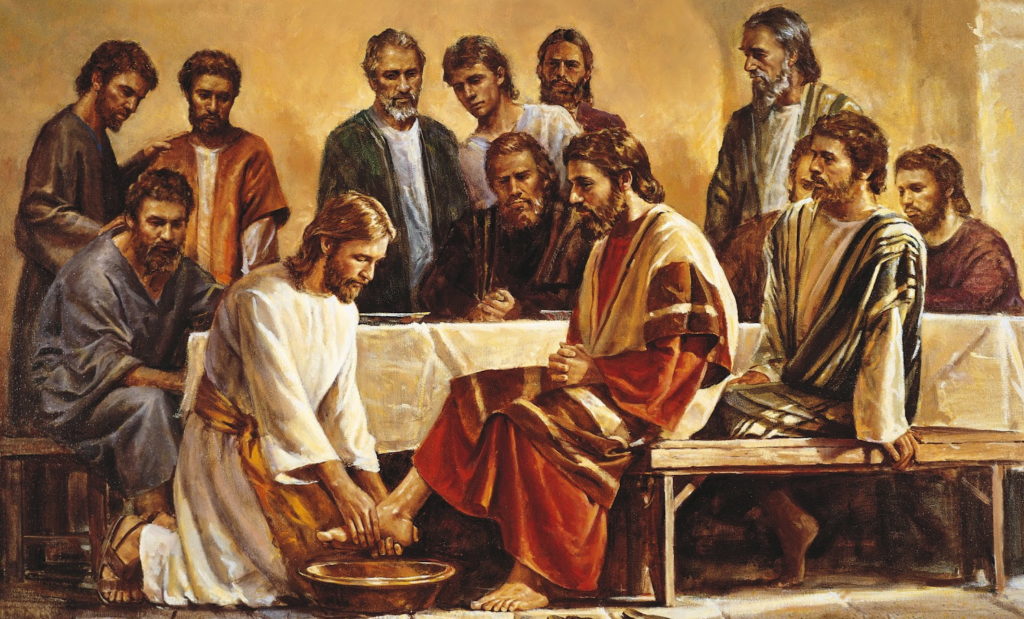Click here to return to Blog Post Intro

In the Discipline of service there is also great liberty. Service enables us to say “no!” to the world’s games of promotion and authority. It abolishes our need (and desire) for a “pecking order.”
Consider the phrase “pecking order”. It is so telling, so revealing. How like chickens we are! In the chicken pen there is no peace until it is clear who is the greatest and who is the least and who is at which rung everywhere in between.

A group of people cannot be together for very long until the “pecking order” is clearly established.
Jesus was not just reversing the “pecking order” as many suppose. He was abolishing it. The authority of which he spoke was not an authority to manipulate and control. It was an authority of function, not of status.
“Whoever would be great among you must be your servant…even as the Son of man came not to be served but to serve” (Matthew 20:25–28). Therefore, the spiritual authority of Jesus is an authority not found in a position or a title, but in a towel.

Self-righteous Service Versus True Service
Self-righteous service comes through human effort. It expends immense amounts of energy calculating and scheming how to render the service.
Self-righteous service requires external rewards. It needs to know that people see and appreciate the effort. It seeks human applause—with proper religious modesty of course. True service is free of the need to calculate results. It delights only in the service. It can serve enemies as freely as friends.
True service is indiscriminate in its ministry. It has heard the command of Jesus to be the “servant of all” (Mark 9:35). Brother Francis of Assisi notes in a letter, “Being the servant of all, I am bound to serve all and to administer the balm-bearing words of my lord.”
Self-righteous service is temporary. It functions only while the specific acts of service are being performed. Having served, it can rest easy. True service is a life-style. It acts from ingrained patterns of living. It springs spontaneously to meet human need.
Service and Humility
More than any other single way, the grace of humility is worked into our lives through the Discipline of service. (See my previous post on “Humility: A Biblical Perspective”.)
When we set out on a consciously chosen course of action that accents the good of others and is, for the most part, a hidden work, a deep change occurs in our spirits. Nothing disciplines the inordinate desires of the flesh like service, and nothing transforms the desires of the flesh like serving in hiddenness.
The apostle John writes, “For all that is in the world, the lust of the flesh and the lust of the eyes and the pride of life, is not of the Father but is of the world” (1 John 2:16). We fail to understand the force of this passage because of our tendency to relegate it all to sexual sin. The “lust of the flesh” refers to the failure to discipline the natural human passions.
C. H. Dodd says that the “lust of the eyes” refers to “the tendency to be captivated by outward show.” He defines the “pride of life” as “pretentious egoism.” In each case the same thing is seen: infatuation with natural human powers and abilities without any dependence upon God. That is the flesh in operation, and the flesh is the deadly enemy of humility.
We must see the difference between choosing to serve and choosing to be a servant. When we choose to serve, we are still in charge. We decide whom we will serve and when we will serve. And if we are in charge, we will worry a great deal about anyone stepping on us, that is, taking charge over us. But when we choose to be a servant, we give up the right to be in charge. There is great freedom in this. If we voluntarily choose to be taken advantage of, then we cannot be manipulated. When we choose to be a servant, we surrender the right to decide who and when we will serve. We become available and vulnerable.
Service in the Marketplace
Service is not a list of things that we do, though in it we discover things to do. It is not a code of ethics, but a way of living. Service to be service must take form and shape in the world in which we live. Therefore, we must seek to perceive what service looks like in the marketplace of our daily lives.
Listen to the spiritual direction of Jeremy Taylor: “Love to be concealed, and little esteemed: be content to want [lack] praise, never be troubled when thou art slighted or undervalued…” Hiddenness is a rebuke to the flesh and can deal a fatal blow to pride.
There is the service of small things. Like Dorcas, we find ways to make “coats and garments for the widows” (Acts 9:39).
Richard Foster recalls this true story from his own life: “During the frantic final throes of writing my doctoral dissertation, I received a phone call from a friend. His wife had taken the car and he wondered if I could take him on a number of errands. Trapped, I consented, inwardly cursing my luck.
As I ran out the door, I grabbed Bonhoeffer’s Life Together, thinking that I might have an opportunity to read in it. Through each errand I inwardly fretted and fumed at the loss of precious time. Finally, at a supermarket, the final stop, I waved my friend on, saying I would wait in the car.
I picked up my book, opened it to the marker, and read these words: ‘The second service that one should perform for another in a Christian community is that of active helpfulness. This means, initially, simple assistance in trifling, external matters. There is a multitude of these things wherever people live together. Nobody is too good for the meanest service. One who worries about the loss of time that such petty, outward acts of helpfulness entail is usually taking the importance of his own career too solemnly.’ ”
Large tasks require great sacrifice for a moment; small things require constant sacrifice. The small occasions return every moment. If we want to be faithful to these small things, nature never has time to breathe, and we must die to all our inclinations. We should a hundred times rather make some great sacrifices to God, however violent and painful, on condition that we be freed with liberty to follow our tastes and habits in every little detail.
Types of Service
Being Served
There is the service of being served. When Jesus began to wash the feet of those he loved, Peter refused. He would never let his Master stoop to such a menial service on his behalf. It is an act of submission and service to allow others to serve us. It recognizes their “kingdom authority” over us. We graciously receive the service rendered, never feeling we must repay it. Those who, out of pride, refuse to be served are failing to submit to the divinely appointed leadership in the kingdom of God.
Common Courtesy
There is the service of common courtesy. We are “to be gentle, and to show perfect courtesy toward all men” (Titus 3:2).
Words of “thank you” and “yes, please,” letters of appreciation and RSVP responses are all services of courtesy. The specific acts will vary from culture to culture, but the purpose is always the same: to acknowledge others and affirm their worth. The service of courtesy is sorely needed in our increasingly computerized and depersonalized society.
Hospitality
There is the service of hospitality. Peter urges us to “Practice hospitality ungrudgingly to one another” (1 Peter 4:9).
Paul does the same and even makes it one of the requirements for the office of bishop in two of his letters (1 Timothy 3:2 & Titus 1:8).
Listening
There is the service of listening. Bonhoffer wrote, “The first service that one owes to others in the fellowship consists in listening to them. Just as love to God begins with listening to His Word, so the beginning of love for the brethren is learning to listen to them.” We desperately need the help that can come through listening to one another.
We do not have to have the correct answers to listen well. In fact, often the correct answers are a hindrance to listening, for we become more anxious to give the answer than to hear. An impatient half-listening is an affront to the person sharing.
Bearing Burdens
There is the service of bearing the burdens of each other.

The “law of Christ” is the law of love, the “royal law” as James calls it (James 2:8). Love is most perfectly fulfilled when we bear the hurts and sufferings of each other, weeping with those who weep.
Sharing the Word of God
Finally, there is the service of sharing the word of Life with one another. The “Poustinias” that were established by Catherine de Hueck Doherty have a rule: those who go into the deserts of silence and solitude do so for others. They are to bring back any word they receive from God and share it with others.
We are dependent upon one another to receive the full counsel of God. The smallest member can bring us a word—we dare not despise the service.
Conclusion
The risen Christ beckons us to the ministry of the towel. Such a ministry, flowing out of the inner recesses of the heart, is life and joy and peace.
Perhaps you would like to begin by experimenting with a prayer to start your day:
“Lord Jesus, as it would please you bring me someone today whom I can serve.”
May the Discipline of Service be ingrained in your life, as you shoot for the stars!
